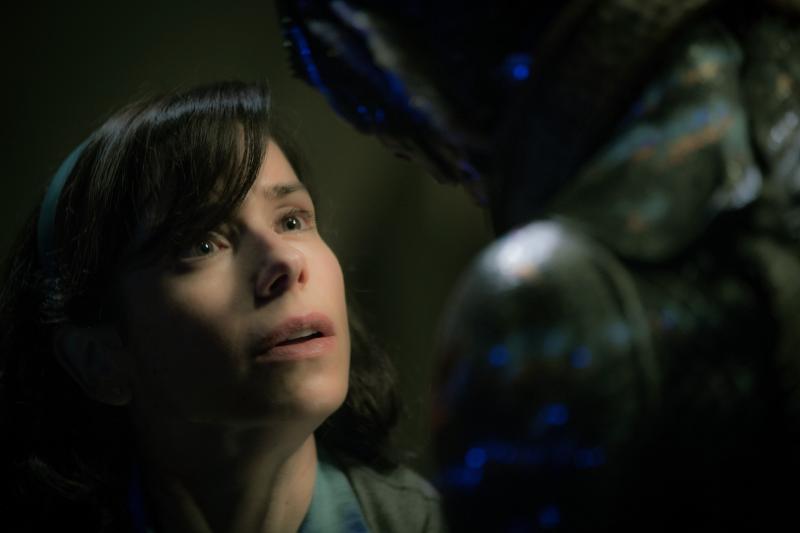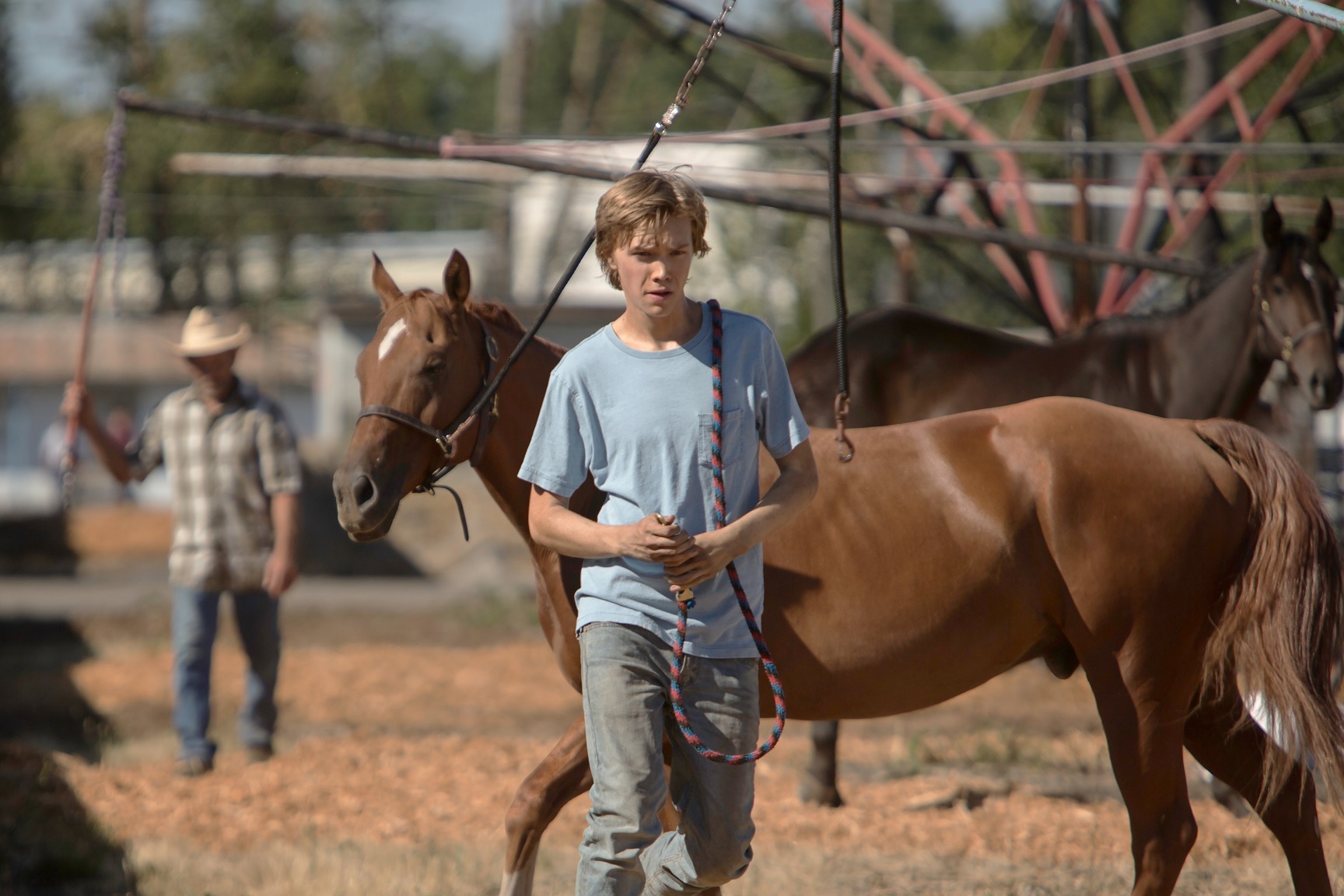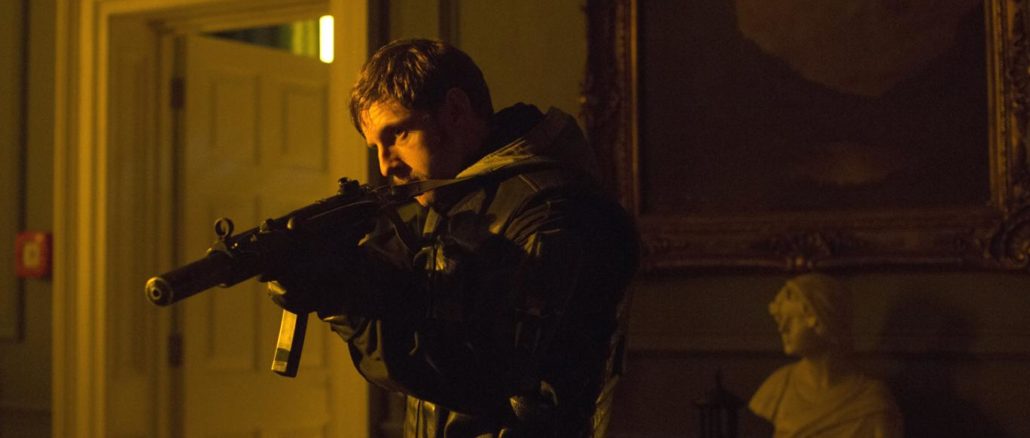LFF 2017: The Shape of Water review – outsider s f and inter-species sex from del Toro | reviews, news & interviews
LFF 2017: The Shape of Water review – outsider s.f. and inter-species sex from del Toro
LFF 2017: The Shape of Water review – outsider s.f. and inter-species sex from del Toro
Sally Hawkins is an innocent wonder in a Cold War creature feature. Also, Lean on Pete and 6 Days

Fish out of water come in various guises in Guillermo del Toro’s Cold War fable, shown at London Film Festival.
More than the scaly, expressive beauty of the creature, Hawkins is the marvel here. Her flutter of sign-language and the sly wit and open ache of her eyes make her silence seem immaterial. She’s matched by Richard Jenkins’s poignant, Oscar-worthy portrayal of clumsy need.
Elisa’s morning wank in the bath lets you know that del Toro isn’t Spielberg. This watery ecstasy is later scaled up for inter-species sex recalling Alan Moore’s taboo-busting Swamp Thing comic. Her and Giles’s mutually supportive, rickety home above a cinema meanwhile contrasts with Strickland’s bright, clean American Dream in the suburbs. Del Toro and Vanessa Taylor’s script is sometimes too on the nose in critiquing US iniquities, and sometimes just right. “Decency,” a general in Kennedy’s supposed new Camelot announces, “that’s for export. We sell it because we don’t use it.” Strickland becomes a poisoned white Dream, creature-chewed fingers rotting black during a hard-charging, brutish rampage.
This is an elegant reconsidering of old monster movies, putting Universal’s recent The Mummy to shame. But though his film is named after poetry, del Toro is too prosaic here to find the fairytale wonder he wants very often.
Lean on Pete
 Andrew Haigh’s Lean On Pete is a fable, too, about a boy and his horse. Based, like 2012’s The Motel Life, on a novel by former Richmond Fontaine singer-songwriter Willy Vlautin, the American odyssey undertaken by 15-year-old Charley (Charlie Plummer, pictured above) and the titular, knackered racehorse is, though, an increasingly desperate affair.
Andrew Haigh’s Lean On Pete is a fable, too, about a boy and his horse. Based, like 2012’s The Motel Life, on a novel by former Richmond Fontaine singer-songwriter Willy Vlautin, the American odyssey undertaken by 15-year-old Charley (Charlie Plummer, pictured above) and the titular, knackered racehorse is, though, an increasingly desperate affair.
Steve Buscemi is memorably sour as a racehorse owner scrabbling for a dubious living, one of several highly fallible father-figures for Charley. “Can we not…talk?” he winces at Chloë Sevigny’s more emotionally engaged jockey. Plummer’s polite, bashful Charlie reminds you how vulnerable boys are. He ages overnight after the painful death of a loved one. Later, we see him alone in the American dark, coyotes howling. He’s made the quixotic decision to walk his beloved horse Lean On Pete across the desert towards the chimeric safety of a long-lost aunt. Haigh films the big, lonesome country with straightforward love. Despite this classical Americana, Charlie’s emaciation and sun-blackened face as he trudges forward isn’t romanticised. Haigh is true to Vlautin in the destitution and violence he encounters and eventually has to perpetrate as he sinks through circles of hell. There’s a beauty to fragile lives which are allowed their humanity, from Gulf War vets to junkies, and unsentimental doom in their vanishing prospects.
You might think of Kes as this boy clings to an animal’s friendship as a defence against a harsh world. Lean On Pete isn’t far off that class of painfully humane cinema. ★★★★
6 Days
 Abbie Cornish is Kate Adie in Toa Fraser’s 1980 Iranian Embassy siege docu-thriller. It’s an altogether dourer affair than Who Dares Wins, 1982’s pulpy right-wing exploitation hit with Judy Davis as a gun-wielding CND terrorist in a cocktail dress. Lewis Collins was that film’s low-wattage star, and his colleague from The Professionals Martin Shaw cameos as a police chief here. 6 Days’ reverence for such humourless officialdom is waring, though we do get the unexpected sight of the late Tim Pigott-Smith as Willie Whitelaw. Other half-remembered figures of the age are revived, from captured Embassy PC Trevor Lock to a televised Alex Higgins final which nearly snookers negotiations. Supposed Thatcher-era mainland riot footage looks suspiciously like the Troubles, and there’s no shortage of thuddingly clunky lines. This Netflix flick also insists on the US pronunciation of I-ran.
Abbie Cornish is Kate Adie in Toa Fraser’s 1980 Iranian Embassy siege docu-thriller. It’s an altogether dourer affair than Who Dares Wins, 1982’s pulpy right-wing exploitation hit with Judy Davis as a gun-wielding CND terrorist in a cocktail dress. Lewis Collins was that film’s low-wattage star, and his colleague from The Professionals Martin Shaw cameos as a police chief here. 6 Days’ reverence for such humourless officialdom is waring, though we do get the unexpected sight of the late Tim Pigott-Smith as Willie Whitelaw. Other half-remembered figures of the age are revived, from captured Embassy PC Trevor Lock to a televised Alex Higgins final which nearly snookers negotiations. Supposed Thatcher-era mainland riot footage looks suspiciously like the Troubles, and there’s no shortage of thuddingly clunky lines. This Netflix flick also insists on the US pronunciation of I-ran.
In 6 Days’ favour, its most sympathetic characters are Mark Strong’s hostage negotiator, and chief hostage-taker Salim (Ben Turner). Strong’s lulling tones would calm a cobra; Salim’s nerves when his arguably terrorist gang find themselves as trapped as their captives, and their Iranian Arabic minority cause (always a murky element of the affair for British onlookers), make this reluctant killer’s bleak prospects real. Jamie Bell’s SAS men (pictured above) thunder in and out of leafy Herefordshire lanes, gagging for a fight. They look like gas-masked, gung-ho aliens as they wait, with just a wall between them and their unsuspecting targets. For an often bad film, 6 Days is sometimes thoughtful and exciting. ★★
The future of Arts Journalism
You can stop theartsdesk.com closing!
We urgently need financing to survive. Our fundraising drive has thus far raised £49,000 but we need to reach £100,000 or we will be forced to close. Please contribute here: https://gofund.me/c3f6033d
And if you can forward this information to anyone who might assist, we’d be grateful.

Subscribe to theartsdesk.com
Thank you for continuing to read our work on theartsdesk.com. For unlimited access to every article in its entirety, including our archive of more than 15,000 pieces, we're asking for £5 per month or £40 per year. We feel it's a very good deal, and hope you do too.
To take a subscription now simply click here.
And if you're looking for that extra gift for a friend or family member, why not treat them to a theartsdesk.com gift subscription?
more Film
 Steve review - educator in crisis
Cillian Murphy excels as a troubled headmaster working with delinquent boys
Steve review - educator in crisis
Cillian Murphy excels as a troubled headmaster working with delinquent boys
 Can I get a Witness? review - time to die before you get old
Ann Marie Fleming directs Sandra Oh in dystopian fantasy that fails to ignite
Can I get a Witness? review - time to die before you get old
Ann Marie Fleming directs Sandra Oh in dystopian fantasy that fails to ignite
 Happyend review - the kids are never alright
In this futuristic blackboard jungle everything is a bit too manicured
Happyend review - the kids are never alright
In this futuristic blackboard jungle everything is a bit too manicured
 Robert Redford (1936-2025)
The star was more admired within the screen trade than by the critics
Robert Redford (1936-2025)
The star was more admired within the screen trade than by the critics
 Blu-ray: The Sons of Great Bear
DEFA's first 'Red Western': a revisionist take on colonial expansion
Blu-ray: The Sons of Great Bear
DEFA's first 'Red Western': a revisionist take on colonial expansion
 Spinal Tap II: The End Continues review - comedy rock band fails to revive past glories
Belated satirical sequel runs out of gas
Spinal Tap II: The End Continues review - comedy rock band fails to revive past glories
Belated satirical sequel runs out of gas
 Downton Abbey: The Grand Finale review - an attemptedly elegiac final chapter haunted by its past
Noel Coward is a welcome visitor to the insular world of the hit series
Downton Abbey: The Grand Finale review - an attemptedly elegiac final chapter haunted by its past
Noel Coward is a welcome visitor to the insular world of the hit series
 Islands review - sunshine noir serves an ace
Sam Riley is the holiday resort tennis pro in over his head
Islands review - sunshine noir serves an ace
Sam Riley is the holiday resort tennis pro in over his head
 theartsdesk Q&A: actor Sam Riley on playing a washed-up loner in the thriller 'Islands'
The actor discusses his love of self-destructive characters and the problem with fame
theartsdesk Q&A: actor Sam Riley on playing a washed-up loner in the thriller 'Islands'
The actor discusses his love of self-destructive characters and the problem with fame
 Honey Don’t! review - film noir in the bright sun
A Coen brother with a blood-simple gumshoe caper
Honey Don’t! review - film noir in the bright sun
A Coen brother with a blood-simple gumshoe caper
 The Courageous review - Ophélia Kolb excels as a single mother on the edge
Jasmin Gordon's directorial debut features strong performances but leaves too much unexplained
The Courageous review - Ophélia Kolb excels as a single mother on the edge
Jasmin Gordon's directorial debut features strong performances but leaves too much unexplained

Add comment